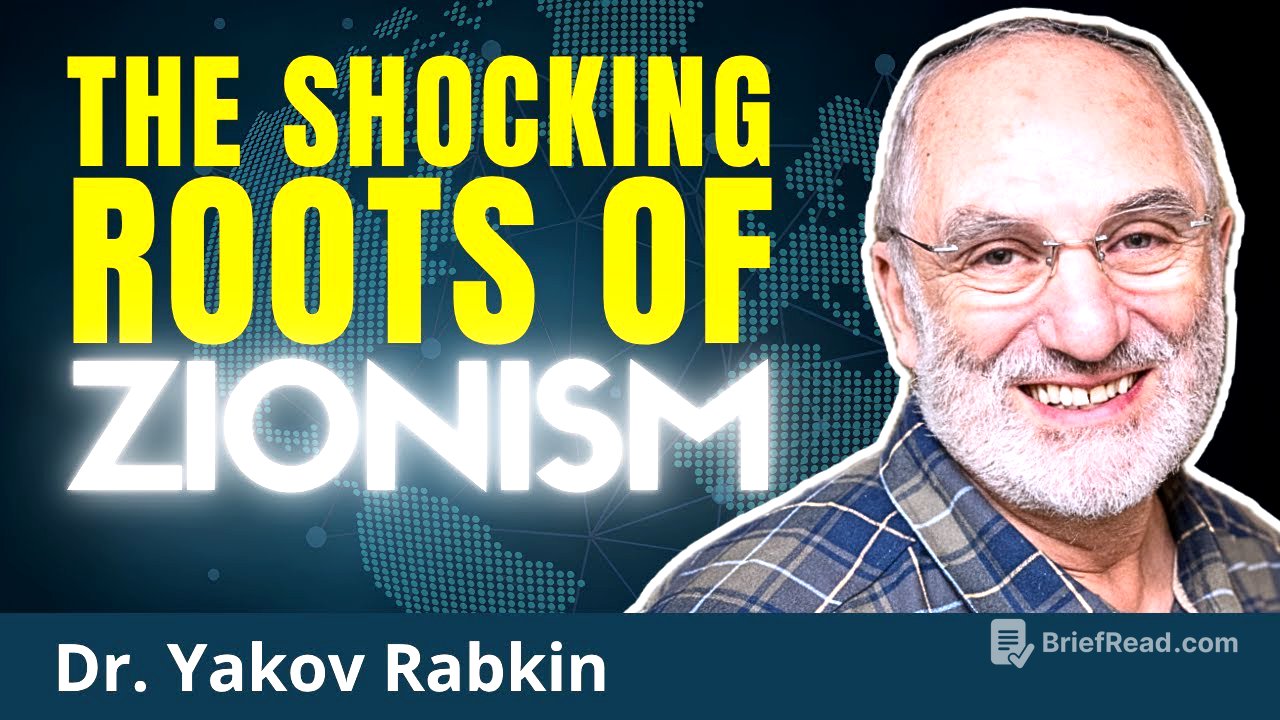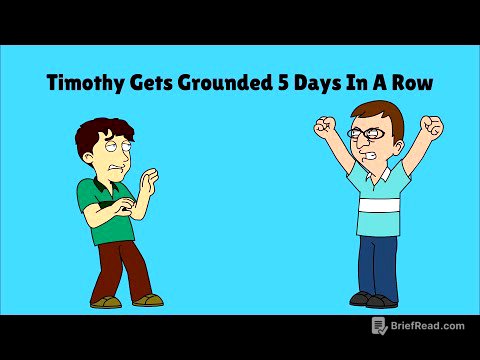TLDR;
This video features an interview with Dr. Yakov Rapkin, a professor emeritus of history, discussing his book on Jewish rejection of Zionism. The conversation covers the distinctions between Zionism, Judaism, and Israel, the origins of Zionism in Protestant Christianity, and the reasons why many Jews historically opposed Zionism. It also addresses the role of violence in Zionism, the impact of Zionism on Middle Eastern Jewish communities, and the equation of Zionism with Judaism. Finally, it explores the pillars of Zionism's success and the reasons why Israel has influence among Western ruling classes.
- Zionism is a European political movement, distinct from Judaism as a religion and Israel as a group of people faithful to the Torah.
- Zionism originated with Protestant Christians who believed that gathering Jews in the Holy Land would hasten the second coming of Christ.
- Many Jews opposed Zionism for theological, social, and political reasons, viewing it as a form of anti-Semitism and a distraction from class struggle.
- Violence and political terrorism played a significant role in Zionism, influenced by the experiences of early Zionists in the Russian Empire.
- Zionism uprooted Middle Eastern Jewish communities, transplanting them to Israel to populate the country after the expulsion of Palestinians.
- The equating of Zionism with Judaism is a recent phenomenon, historically, some Zionists collaborated with anti-semites and Nazis to resettle Jews in Palestine.
- Israel's influence among Western ruling classes is due to its provision of high technology, surveillance methods, and population control expertise.
Preview & Introduction [0:00]
The video introduces Dr. Yakov Rapkin, a professor emeritus of history at the University of Montreal, and his new book about Jewish rejection of Zionism. The host, Pascal from Neutrality Studies, expresses his enthusiasm for the book and its illuminating perspective on the topic. The discussion aims to explore the conceptual distinctions between Zionism, Judaism, and Israel.
Distinguishing Zionism, Judaism & Israel [1:24]
Judaism is a religion centered on the temple in Jerusalem, which became portable as Jews dispersed around the world. Traditionally, Judaism was considered one of the three monotheistic religions, alongside Christianity and Islam, with the people of Israel defined as those loyal to the Torah. Israel historically referred to a group of people faithful to these commandments. However, with the creation of the state of Israel in 1948, the word "Israel" became associated with the modern state. Zionism is a political movement that became Jewish at the end of the 19th century, though the idea of gathering Hebrews in the Holy Land was originally a Christian Protestant idea. Some Jews embraced Zionism, but the vast majority rejected it when it emerged.
The Protestant Christian Origins of Zionism [4:48]
Zionism originated with Protestant Christians due to the history of Protestantism and the translation of the Bible into vernaculars. The Catholic Church traditionally interpreted the Bible, but Protestantism encouraged direct reading and literal interpretation. In Judaism, the relationship with the Holy Land is conditional, based on obeying commandments. Protestants, reading biblical prophecies of return to the Holy Land, developed the idea that gathering Hebrews there could speed up the second coming of Christ. Today, Christian Zionists are numerous, with millions of followers, significantly more than the number of Jews in the world.
Why Zionism is an "Enemy of the Jewish Nation" [9:09]
The idea of gathering Hebrews by political or military means is alien to Jewish tradition, where the relationship with the Holy Land is normative and conditional. The Talmud lists three oaths preventing Jews from returning to the Holy Land before the coming of the Messiah. When Zionism emerged, most Jews rejected it for theological reasons, as it contradicted normative Jewish texts and converted a group defined by loyalty to divine commandments into a regular nationality. Many Jews in 19th-century Europe, adjusting to new conditions after emancipation, saw Zionism as a variation of anti-Semitism, telling them they did not belong and should go to Palestine.
The Jewish Cabinet Member Who Opposed the Balfour Declaration [14:08]
The only Jewish member of the British government, Mr. Montigue, opposed the Balfour Declaration, accusing the British government of anti-Semitism for being pro-Zionist. Additionally, socialist and communist groups opposed Zionism, viewing it as a distraction of the Jewish working class from class struggle and a bourgeois nationalism detrimental to the socialist cause.
How Early Zionists Justified Their Ideology [15:32]
Theodor Herzel, a successful Austrian journalist and playwright of Jewish Hungarian origin, was concerned about the oppression of Jews in the Russian Empire, where emancipation did not exist. He also worried about anti-Semitism faced by successful Jews in Europe. Before embracing Zionism, Herzel considered converting all the Jews of Vienna into Catholicism. The first Zionist Congress in 1897 was held in Basel, Switzerland, because German Jewish organizations petitioned the government to forbid it from taking place in Munich, Germany.
The Role of Violence & Political Terrorism in Zionism [18:48]
Violence was abhorred by the Jewish tradition, partly because Jews lacked political power. Zionist violence stemmed from the logic of colonial settlement, where friction and violence arise when an alien group enters a populated land. Many young Zionist settlers in Palestine embraced violence due to their experience in underground revolutionary work in the Russian Empire, including political terrorism. The first victim of Zionist political terrorism was a Dutch Jew, Yakov Dhan, assassinated in 1924 for organizing religious anti-Zionist activities.
Were There Non-Violent Zionist Factions? [24:44]
While many leaders of the Zionist movement in Palestine came from the Russian Empire with a background in violence, there were other groups. German Jews, particularly those who went to Palestine after 1933, played a significant role in building up the Zionist infrastructure and often opposed the idea of separate development. Associations like Brit Shalom argued for a common state for both local populations and immigrant Jews. However, these groups largely lost out to the Russian Zionists, who transferred the political tradition of violence and terrorism into Palestine, which eventually became a common Israeli culture.
How Zionism Uprooted Middle Eastern Jewish Communities [28:52]
Zionism, a European ethnic nationalism, was transplanted to Palestine and was alien to Jews outside of Europe. Emissaries of the Zionist movement influenced young people in countries like Iraq and Morocco, sometimes using provocation to frighten Jews into immigrating. Jewish communities in countries where they had lived for centuries were uprooted and brought to Israel to populate the country after the expulsion of Palestinians, as European Jews had been decimated by the Nazi genocide. Unlike Jews in Eastern and Central Europe, who were concentrated in one area and spoke Yiddish, Jews in Iran or Iraq spoke the language of the country and considered themselves Iranians or Iraqis.
The Iranian Jewish Community & Accusations of "Stockholm Syndrome" [34:43]
The Jewish community in Iran, though small, has a long history and considers themselves integrated Iranians. During conflicts involving Israel, they have been vocal in calling for an end to violence, which has been dismissed by Zionists as a form of Stockholm syndrome. The history of Jews in Iran is very different from that of Jews in Eastern Europe, and projecting East European ethnic nationalism onto non-European countries creates tension and problems. Unlike in Europe, there are no armed guards in front of synagogues in Iran, even though it is an anti-Zionist regime.
The Equating of Zionism with Judaism [38:56]
The equating of Zionism with Judaism is a recent phenomenon. Theodor Herzel believed that anti-semites would be Zionism's most loyal allies because they both wanted to get rid of the Jews. In 1934, Nazi leadership sent someone to Palestine to see how Jews could be resettled, as Nazis wanted to cleanse Germany of Jews. Zionists were treated more positively by the Nazis than other Jews in the 1930s before the genocide. Opposition to Zionism and Israeli policies is not anti-Semitism but a response to the horror unleashed on civilian populations. Mistaking Jews for Israel is politically convenient but wrong, as young Jews are turning against Israel.
The Pillars of Zionism's Success [44:04]
The genuine suffering of Jews in the Russian Empire prior to 1917 was a significant factor, though most Jews immigrated to the Americas. Anti-Semitism after World War I in Eastern European countries and the Nazi genocide created sympathy for survivors, which the Zionist movement used to argue for a separate state for Jews. While one lesson from the genocide could be the need to avoid regimes that discriminate based on ethnicity or religion, Europe conveniently exported its guilt to West Asia, where Palestinians paid for the sins of Europeans. Colonialism was still legitimate in 1948, and the values professed in recent decades are recent, as European history is based on racism and colonial exploitation.
Why Israel Influences Western Ruling Classes [55:06]
Israel is popular among the ruling class because it supplies high technology, surveillance methods, and know-how of population control, tested on Palestinians. This technology is crucial due to the crisis in many countries caused by extreme wealth inequality and declining life expectancy, necessitating population control. Some Islamophobes in Europe believe Israel knows how to deal with Arabs and that they should learn from them. Police forces from North America and Canada are sent to Israel to learn from the Israeli police forces. Israel destabilizes West Asia, creates immigration waves towards Europe, and then teaches Europe how to deal with it, using the same kind of violence.
Where to Find Yakov Rabkin's Work [1:00:12]
Dr. Rapkin's most recent book can be found at israelpalestanbook.com, where information on how and where to buy it is available. His other books are available on Amazon and other bookstores.









